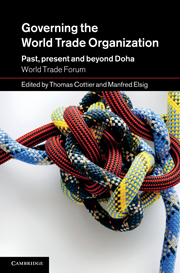Book contents
- Frontmatter
- Contents
- List of figures
- List of tables
- Notes on Contributors
- Preface
- List of abbreviations
- 1 Introduction
- PART I Setting the stage
- PART II Boundaries
- PART III Emerging and established powers
- PART IV Weaker actors
- 8 Developing countries and monitoring WTO commitments in response to the global economic crisis
- 9 Exploring the limits of institutional coherence in trade and development
- PART V The consensus principle
- PART VI Quo vadis?
- Index
- References
9 - Exploring the limits of institutional coherence in trade and development
Published online by Cambridge University Press: 07 September 2011
- Frontmatter
- Contents
- List of figures
- List of tables
- Notes on Contributors
- Preface
- List of abbreviations
- 1 Introduction
- PART I Setting the stage
- PART II Boundaries
- PART III Emerging and established powers
- PART IV Weaker actors
- 8 Developing countries and monitoring WTO commitments in response to the global economic crisis
- 9 Exploring the limits of institutional coherence in trade and development
- PART V The consensus principle
- PART VI Quo vadis?
- Index
- References
Summary
Introduction
Much of the discussion of the current state of trade liberalisation has focused on the shortfall in coherence in global trade negotiations. ‘Coherence’ in this sense refers generally to multilateral support from outside the WTO for efforts to improve the functioning of the trading system, particularly with regard to the aid-for-trade programmes in developing countries. However, in principle, ‘coherent’ support can also come from smaller regional organisations and agencies, national governments, non-governmental organisations (NGOs), and the private efforts of groups and individuals. Specifically, the World Trade Organization (WTO) Hong Kong Ministerial Declaration in 2005 called for an expansion of aid-for-trade in order for developing countries to benefit from WTO agreements (WTO 2005; see also Page 2007). The WTO has championed these efforts with task force reports on aid for trade (see WTO 2006; Evenett 2009), and the Integrated Framework aid programmes.
The motivation for these efforts stems from the possibility that progress, consensus and final agreement in future trade negotiations may require aid and technical assistance to developing countries that trade negotiators cannot effectively promise, and which at present cannot be written into multilateral trade agreements. The WTO charter declares the goal of cooperation with the World Bank and the International Monetary Fund (IMF) without the benefit of an institutional framework for any coordination. Nonetheless, many such efforts are taking place, particularly in the form of trade capacity building through World Bank funding, and the Integrated Framework, not to mention many other aid programmes.
- Type
- Chapter
- Information
- Governing the World Trade OrganizationPast, Present and Beyond Doha, pp. 188 - 214Publisher: Cambridge University PressPrint publication year: 2011

